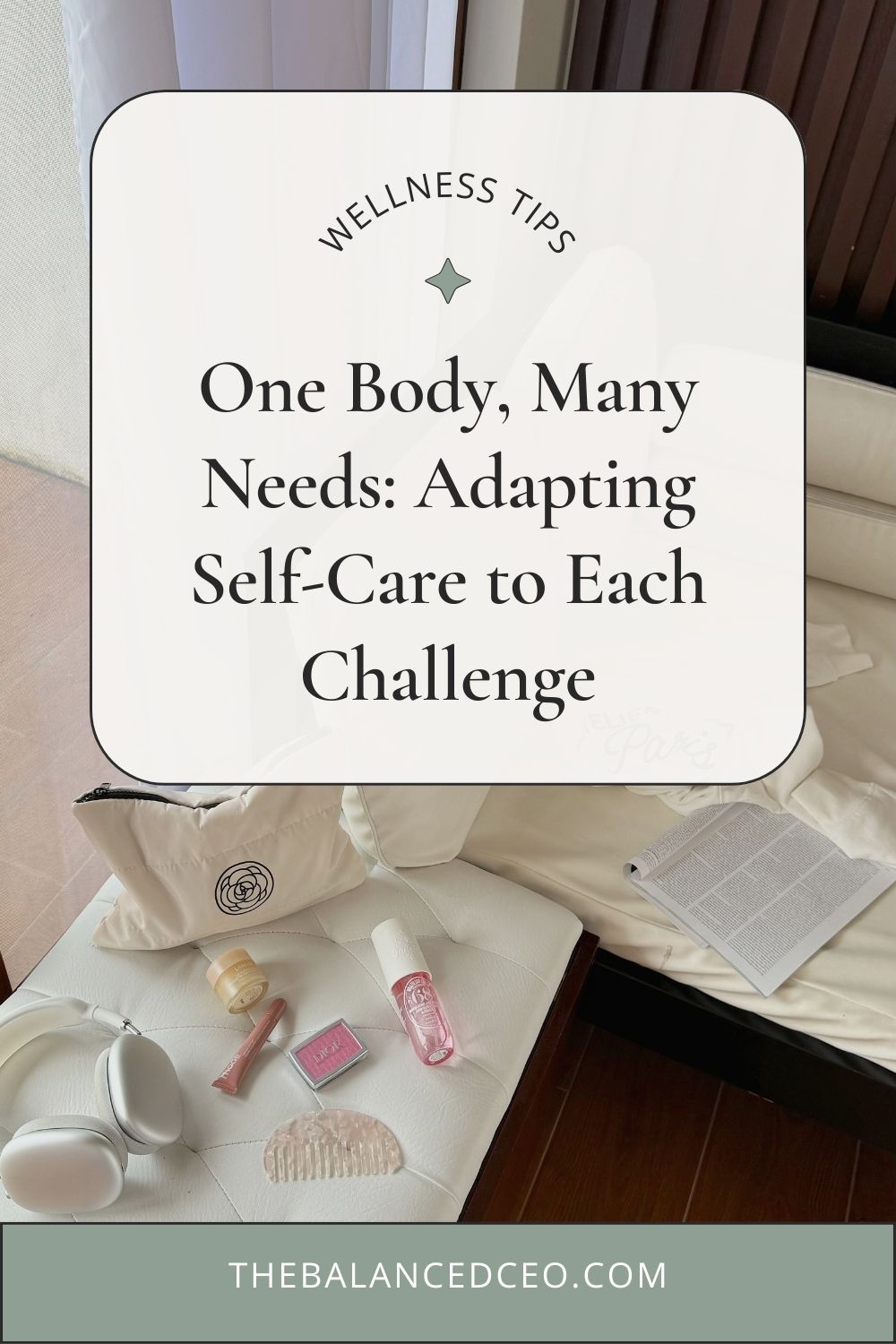This post may contain affiliate links, which means I’ll receive a commission if you purchase through my links, at no extra cost to you. Please read full disclosure for more information.

Life throws challenges at us every day. Stress at work, an aching back, a skipped meal—we all face these hurdles. Our body, a hardworking partner, signals when it needs attention. Self-care isn’t just about pampering; it’s about tuning in and responding.
Your body’s needs aren’t one-size-fits-all. They shift with life’s demands. So, how do we adapt? To understand this in the simplest way. Here, we will explore how to care for our bodies, no matter what’s going on, in simple, actionable ways.
Skin Problems: Caring for Your Body’s Barrier
With time, we all face different skin problems—like adult acne, angiomas, or rosacea—that not only trouble us but can also take a toll on our confidence. Factors like pollution, diet, and stress can make things worse.
How to Care:
Visit a dermatologist. They can identify the root cause, provide effective treatments, and guide you on the right skincare routine. Booking an online appointment is super easy and saves time. Combine their advice with self-care—stay hydrated, use gentle cleansers, and protect your skin from the sun.
Pro Tip: If you already use skincare products, always check with your dermatologist to ensure they’re safe and effective for your skin type.
Time Management: Finding Balance
Balancing work, family, and personal goals can feel overwhelming. Often, we put our needs last, which can lead to burnout.
How to Care:
To manage your time better, prioritize tasks and focus on what truly matters. Start your day by listing the three most important things to accomplish. Use strategies like the “Pomodoro Technique” (working in short bursts with breaks) to stay productive. And don’t forget to set aside moments for yourself, even if it’s just 10 minutes to breathe or enjoy a quiet cup of coffee.
Quick Tip: Use a planner or a simple app to track your day. Scheduling 10 minutes of “me time” can make a big difference.
Stress Management: Calming the Storm
Stress affects your body and mind, showing up as tension, fatigue, or even sickness. Managing it is essential for long-term health.
How to Care:
Deep breathing exercises, daily movement, and relaxation techniques are key to reducing stress. For example, a quick walk outside or even a few minutes of stretching can release tension. Make time for activities that calm you, like listening to music, journaling, or spending time with loved ones.
Remember, small actions add up to big relief.
Sleep Troubles: Recharging Your Battery
Lack of sleep can leave you exhausted and unable to focus. Over time, it impacts everything from your memory to your immune system.
How to Care:
To improve sleep, establish a consistent bedtime routine. Go to bed and wake up at the same time daily, even on weekends. Create a peaceful sleeping environment—keep your room dark, cool, and free from distractions. Avoid screens an hour before bed, as the blue light can disrupt your body’s natural rhythm. A soothing herbal tea or calming music can also help prepare your body for rest.
Pro Tip: Try sipping herbal tea, like chamomile, before bed to help you relax.
Physical Pain: Moving with Care
Aches and pains can interfere with your day. Whether it’s a sore neck from poor posture or joint pain from overuse, ignoring these signals can worsen the problem.
How to Care:
Physical care starts with movement. Stretch regularly to ease stiffness, and pay attention to proper posture, especially during long hours at a desk. Use heat or ice packs for relief, depending on whether it’s muscle tension (heat) or swelling (ice).
For persistent issues, seek guidance from a specialist like a physical therapist. Listening to your body helps you address pain before it escalates.
Emotional Health: Caring for Your Mind
Your mental health is just as important as your physical health. Ignoring emotions can lead to stress and unhappiness.
How to Care:
Caring for your emotional well-being involves both expression and connection. Talk to someone you trust about how you’re feeling, or write your thoughts in a journal. Practice gratitude by listing three things you’re thankful for each day—it helps shift your focus to the positives.
Small acts of kindness toward yourself, like taking a quiet moment to breathe or enjoying a favorite hobby, can boost your mood significantly.
Conclusion
Your body does so much for you. It’s your responsibility to care for it in return. Challenges like stress, pain, or time crunches are part of life, but they don’t have to overwhelm you. By making small adjustments, you can adapt self-care to fit your life. After all, when we care for ourselves, we’re better for the world around us.





Leave a Reply